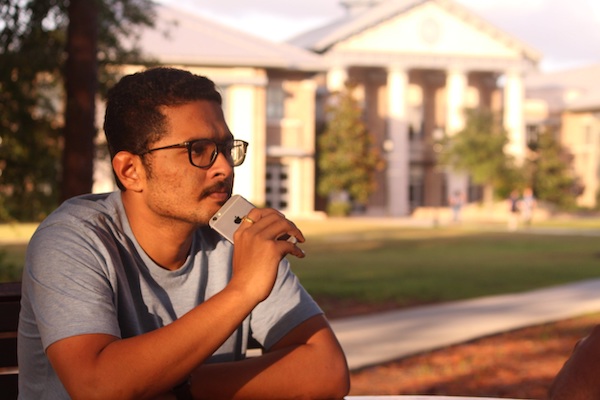USCB's Computational Science Program Draws Students from India
Student News
 When Prathamesh Kadam decided to pursue a career in the emerging field of computational
science, he transferred from a technical college in India to the University of South
Carolina Beaufort to earn a Bachelor of Science degree in the discipline.
When Prathamesh Kadam decided to pursue a career in the emerging field of computational
science, he transferred from a technical college in India to the University of South
Carolina Beaufort to earn a Bachelor of Science degree in the discipline.
Kadam, a 20-year-old rising senior at USCB, didn’t come alone. He was accompanied by three classmates from the Vidyalankar School of Information Technology in Mumbai, Kadam’s hometown. VSIT, as it’s known, is an engineering college affiliated with the University of Mumbai.
A thoughtful young man with a passion for technology, Kadam has carefully planned each step of his projected path from a bachelor’s degree to work experience to a master’s degree to more substantial work—all with the goal of becoming a web designer skilled in designing and building websites, and managing and testing the software that supports them.
He is already engaged in a website-branding project while working as an IT intern at the Beaufort Digital Corridor. The BDC is a self-described “community-sourced initiative to attract, nurture and promote Beaufort’s technology entrepreneurs, and ultimately the region’s tech economy, through an array of impactful programs, products and events…”
So, why did he select USCB?
“I had gone through some videos on the Internet about USCB,” he says. “Then I went on the website and read about the school. I had some positive feedback from the students. I watched some YouTube videos regarding USCB, and, financially, it was fitting in my budget, so I chose to come here.”
Three of his classmates followed him: Kirk L. D’monte, Nikhilesh U. Sawant and Yash R. Ambavade, all rising seniors and all computational science majors. The four represent part of the vanguard of an expanding contingent of international students drawn to USCB for a wide variety of reasons, not the least of which is academic excellence bolstered by a highly skilled faculty dedicated to teaching, research, academic advancement, experiential learning and student support.
“We learn tremendously from those whose perspectives and cultures are different from our own,” says Eric Skipper, Ph.D., provost and executive vice chancellor for academic affairs at USCB. “That is why USCB is so committed to growing its international profile. Studying abroad is a transformative experience for our own students and for those who come from other countries to study at USCB.”
Kadam and his classmates have found they can rely on a broad spectrum of support not only from faculty and staff on the three international subcommittees, but also from their professors and even fellow students.
“The people over here are very helpful,” Kadam says, “especially the faculty and staff. We talk with them about the drastic change in the education system coming here to the United States. They are supportive and helpful with us, and they understood everything. They called us and advised us to come to their office, so we would go to their office and study more about that particular subject or topic. That was pretty good.
“The students and professors were very helpful,” he adds. “When we first went to the cafeteria, everything was new to us. But now we are used to it. In the vegan counter, we can get very good curry with vegetables. I love that.”
Kadam’s career path is firmly fixed in his mind. After graduating from USCB with a bachelor’s degree in computational science, he intends to work for 18 months to gain experience in the field. Then he plans to return to USCB for a master’s degree in computational science. He will then devote the next three years to more substantial work here in his field. At that point, his visa will expire and he will return to India.
Kadam is a strong proponent of USCB’s internationalization initiative. “When you transfer from one country to another, you have the opportunity to meet new people with different mindset, different working strategies. This helps you because it makes you stronger. It depends on the person. When someone is talking with me, a new person, if we are talking on a particular subject, I usually pick up things that can help me in my future.”
Dr. Villena-Alvarez agrees. “The advantages of us bringing a lot of international students on campus, and this includes the students from India as well as the Netherlands, is that it opens the perspective of our existing student body to multiple cultures. When you open their perspective this way, then they become more open to other ways of doing things. They are more open to understanding different ways of looking at something. So, really, their education outside the classroom, just by relating to international students, is increased. We’re not really internationalizing in class. We are internationalizing their experience by having them rub elbows with foreign students.”
“With emerging technologies changing the world at a very fast pace,” Dr. Skipper says, “our students must capitalize on those qualities that make them distinctly human. Engaging globally opens our minds and hearts in ways that few other experiences can.”
University of South Carolina Beaufort
International